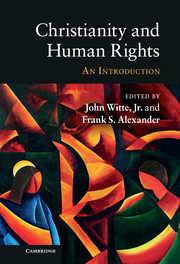Book contents
- Frontmatter
- Contents
- List of contributors
- Acknowledgements
- The first word: to be human is to be free
- Introduction
- FOUNDATIONS AND DEVELOPMENTS OF HUMAN RIGHTS
- CHRISTIANITY AND THE MODERN HUMAN RIGHTS FRAMEWORK
- 9 The human rights system
- 10 The image of God: rights, reason, and order
- 11 Religion and equality
- 12 Proselytism and human rights
- 13 Religious liberty, church autonomy, and the structure of freedom
- 14 Christianity and the rights of children: an integrative view
- 15 Christianity and the rights of women
- 16 Christianity, human rights, and a theology that touches the ground
- 17 A right to clean water
- The final word: can Christianity contribute to a global civil religion?
- Biblical index
- Index
16 - Christianity, human rights, and a theology that touches the ground
Published online by Cambridge University Press: 05 June 2012
- Frontmatter
- Contents
- List of contributors
- Acknowledgements
- The first word: to be human is to be free
- Introduction
- FOUNDATIONS AND DEVELOPMENTS OF HUMAN RIGHTS
- CHRISTIANITY AND THE MODERN HUMAN RIGHTS FRAMEWORK
- 9 The human rights system
- 10 The image of God: rights, reason, and order
- 11 Religion and equality
- 12 Proselytism and human rights
- 13 Religious liberty, church autonomy, and the structure of freedom
- 14 Christianity and the rights of children: an integrative view
- 15 Christianity and the rights of women
- 16 Christianity, human rights, and a theology that touches the ground
- 17 A right to clean water
- The final word: can Christianity contribute to a global civil religion?
- Biblical index
- Index
Summary
It is always fashionable to quote French philosopher and theologian Jacques Maritain when discussing the birth of the international human rights movement, specifically, the Universal Declaration of Human Rights forged in 1948. Acknowledging the plurality of opinion during that exercise, Maritain differentiated between the “what” and the “why” of human rights. The strength of that document is anchored in the agreement as to the “what,” but, as Maritain came to realize, “with the ‘why’, the dispute begins.”
The “dispute” was ameliorated when the rationale for human rights, for all intents and purposes, was put aside. Political expediency, the art of the possible, carried the day. But as most knowledgeable observers of that founding document would agree, today's environment for human rights would likely not allow even the “what” of this document to be written and approved. The Universal Declaration has been consigned to selective implementation at best and, at worst, lip service within the international community. This begs the question: is the vagueness of the rationale for human rights a contributor to the uneven and, at times, ineffective presentation of these rights today? Does the lack of a “why” dilute the power of the “what?”
Insofar as this was a mistake in formulating human rights agreements in the past, it is one that can be, and must be, avoided in this book.
- Type
- Chapter
- Information
- Christianity and Human RightsAn Introduction, pp. 320 - 334Publisher: Cambridge University PressPrint publication year: 2010
- 1
- Cited by



